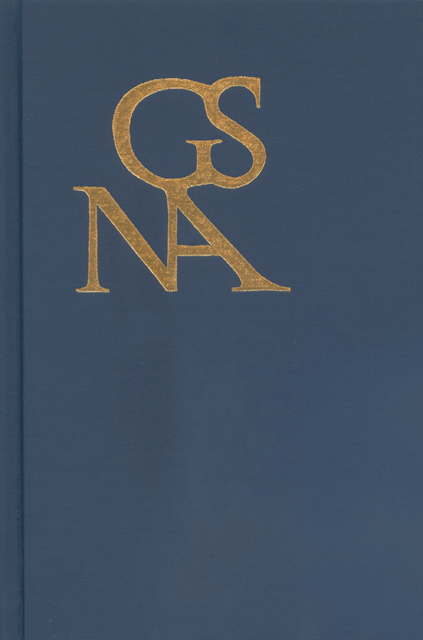Book contents
- Frontmatter
- Contents
- Thomas P. Saine (1941–2013)
- On the Logic of Change in Goethe’s Work
- Space and Place in Goethe’s “Alexis und Dora”
- Countermemory in Karoline von Günderrode’s “Darthula nach Ossian”: A Female Warrior, Her Unruly Breast, and the Construction of Her Myth
- Bad Habits of the Heart: Werther’s Critique of Ill Humor in the Context of Contemporary Psychological Thought
- Confessions of a Childless Woman: Fictional Autobiography around 1800
- Faust’s Begehren: Revisiting the History of Political Economy in Faust II
- Sacrifice in Goethe’s Faust
- Constructions of Goethe versus Constructions of Kant in German Intellectual Culture, 1900–1925
- Das Innere der Natur und ihr Organ: von Albrecht von Haller zu Goethe
- Die Titelkupfer von Moritz Retzsch zu Goethes Ausgabe letzter Hand
- Zu Goethe und der Islam—Antwort auf die oft aufgeworfene Frage: War Goethe ein Muslim?
- Book Reviews
Bad Habits of the Heart: Werther’s Critique of Ill Humor in the Context of Contemporary Psychological Thought
Published online by Cambridge University Press: 02 June 2023
- Frontmatter
- Contents
- Thomas P. Saine (1941–2013)
- On the Logic of Change in Goethe’s Work
- Space and Place in Goethe’s “Alexis und Dora”
- Countermemory in Karoline von Günderrode’s “Darthula nach Ossian”: A Female Warrior, Her Unruly Breast, and the Construction of Her Myth
- Bad Habits of the Heart: Werther’s Critique of Ill Humor in the Context of Contemporary Psychological Thought
- Confessions of a Childless Woman: Fictional Autobiography around 1800
- Faust’s Begehren: Revisiting the History of Political Economy in Faust II
- Sacrifice in Goethe’s Faust
- Constructions of Goethe versus Constructions of Kant in German Intellectual Culture, 1900–1925
- Das Innere der Natur und ihr Organ: von Albrecht von Haller zu Goethe
- Die Titelkupfer von Moritz Retzsch zu Goethes Ausgabe letzter Hand
- Zu Goethe und der Islam—Antwort auf die oft aufgeworfene Frage: War Goethe ein Muslim?
- Book Reviews
Summary
THE IMPORTANCE OF CONTEMPORARY PSYCHOLOGY and philosophical anthropology to an understanding of late eighteenth-century German literature has been highlighted in several major studies published in the last four decades. Although Werther has been interpreted in the context of diverse aspects of contemporary psychophysiological thought, the discussion of ill humor (“üble Laune”) in the text has not been subjected to renewed scrutiny against this backdrop. This article endeavors to close this gap, placing Werther's views on ill humor in their contemporary psychological context and exploring anew their significance for the novel as a whole. In so doing, it challenges the interpretation of “üble Laune” in Werther put forth by Stuart Atkins in 1948 in his seminal article “J. C. Lavater and Goethe,” and largely unquestioned since— namely, that Werther succumbs to the very vice against which he inveighs. Situating the treatment of “üble Laune” in Werther in the context of contemporary psychology, this article urges reassessment of this position, in particular because discussions of ill humor by eighteenth-century German psychologists raised issues of free will and responsibility that render Atkins's interpretation problematical. Furthermore, this article also highlights the importance of the theme of ill humor in underscoring the ambiguity of Werther's suicide.
Werther's Speech in the Light of Contemporary Psychological Discussions of Ill Humor
In his letter of July 1, 1771, Werther relates delivering his impassioned speech on “üble Laune” to an audience of Lotte, the old pastor of St. –– and his wife, their daughter Friederike, and her suitor Herr Schmidt, whose apparent ill humor and its assumed impact on the assembled company have served to provoke Werther's indignation. Werther's curiously precise description of “üble Laune” in this speech as “ein innerer Unmuth über unsere eigene Unwürdigkeit, ein Mißfallen an uns selbst, das immer mit einem Neide verknüpft ist, der durch eine thörichte Eitelkeit aufgehetzt wird” (an inner dissatisfaction with our own unworthiness, a displeasure with ourselves forever tied to envy that is stimulated by foolish vanity), has been the source of some critical debate. The most straightforward part of this statement, the identification of ill humor as “dissatisfaction with our own unworthiness” and “displeasure with ourselves,” refers to a tendency inherent in “üble Laune” to be self-perpetuating that was also remarked on by contemporary writers on psychology. Dissatisfaction and ill humor lock us in a vicious cycle, for we become bad-tempered over our bad temper.
- Type
- Chapter
- Information
- Goethe Yearbook 21 , pp. 57 - 78Publisher: Boydell & BrewerPrint publication year: 2014



